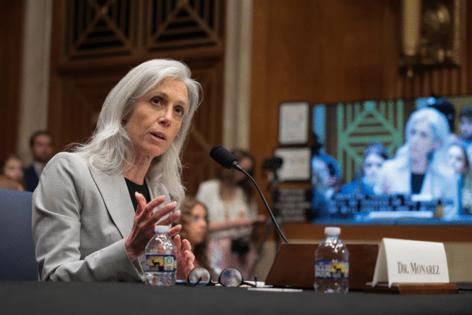HHS moves to oust CDC director after vaccine confrontation
Published in News & Features
The Trump Administration moved to oust U.S. Centers for Disease Control and Prevention Director Susan Monarez just weeks into her tenure, and several senior leaders have resigned, as disputes with Health and Human Services Secretary Robert F. Kennedy Jr. over vaccine policy exploded into the open on Wednesday.
The U.S. Department of Health and Human Services said Wednesday in a post on X that Monarez “is no longer director of CDC.”
In an emailed statement, attorneys representing Monarez said that she “has neither resigned nor received notification from the White House that she has been fired,” but that she was being “targeted” because she “refused to rubber-stamp unscientific, reckless directives and fire dedicated health experts.”
HHS’ announcement of Monarez’s ousting follows a confrontation she had on Monday with Kennedy, in which she pushed back against his vaccine stance, according to a person familiar with the matter who was not authorized to speak publicly. Monarez had told CDC employees she was asked to attend an HHS meeting in person in D.C. on Monday, according to an internal staff message viewed by Bloomberg.
At least three senior CDC leaders told coworkers they were resigning Wednesday, according to emails viewed by Bloomberg. Demetre Daskalakis, director of the National Center for Immunization and Respiratory Diseases; Deb Houry, chief medical officer and deputy director for Program and Science at CDC; and Dan Jernigan, director of the National Center for Emerging and Zoonotic Infectious Diseases, notified staffers of their departure.
“I am not able to serve in this role any longer because of the ongoing weaponizing of public health,” Daskalakis wrote. “You are the best team I have ever worked with, and you continue to shine despite this dark cloud over the agency and our profession.”
The resignations come weeks after the CDC was targeted by a gunman, leaving a police officer dead. Wednesday’s upheaval underscores the growing distrust between many longtime agency scientists and Secretary Kennedy. Current and former HHS employees wrote an open letter blaming Kennedy for spreading vaccine misinformation that they argued fueled the attack.
The attempted removal of Monarez injects new uncertainty for staffers that remain following massive layoffs earlier in the year and has intensified concerns about scientific integrity at the public health agency.
HHS and the White House referred Bloomberg to the Health Department’s X post.
Daskalakis, Houry and Jernigan couldn’t be reached for comment.
A clash over COVID
Kennedy’s controversial views on vaccines were already the subject of open dispute on Wednesday. The Food and Drug Administration approved COVID shots for a far narrower group than was eligible to receive them last year. While in 2024, the agency cleared the vaccines for everyone over 6 months, this season only those 65 and over or with underlying conditions will be able to get them without first consulting with a doctor. The move followed a demand from Kennedy in May for manufacturers to further test shots.
The decision drew rebukes from medical groups, who recommend them for most children and adults. The Infectious Diseases Society of America said Kennedy’s tougher stance on COVID shots put millions of lives at risk.
Earlier in the week, Jen Layden, the director for the Office of Public Health Data, Surveillance, and Technology, also told staff she was resigning, according to people familiar with the matter. The chief operating officer and longtime CDC employee Christa Capozzola was also replaced, according to people familiar with the matter. Neither could be reached for comment.
‘Hand-picked’
In March, Kennedy said he “hand-picked” Monarez for the director position. She was confirmed in late July after President Donald Trump’s first choice for the post, Dave Weldon, was abruptly withdrawn over concerns about his vaccine views.
She is the first CDC director who was confirmed by the Senate, after a new law passed after the COVID-19 pandemic required lawmakers to approve nominees for the position.
Because the role is now a presidential appointment, the White House needs to authorize a decision to fire the CDC director, though the individual could choose to resign.
“This is yet another example of Kennedy’s chaotic approach to public health,” said Nirav Shah, former principal deputy director of the agency. “At a time of increasing threats to public health, what the CDC needs is stable leadership. This type of instability will not make America healthy again.”
In May, the White House pulled its nomination for Janette Nesheiwat to be U.S. surgeon general shortly before her confirmation hearing. Trump later nominated Casey Means to be surgeon general, citing her “impeccable ‘MAHA’ credentials.”
Before being tapped as the acting head of the CDC, Monarez was deputy director of the Advanced Research Projects Agency for Health, a federal agency created during the Biden administration that set out to fund innovative biomedical research.
Monarez has had a long career in government service, unlike some of Trump’s other picks for top health roles in his administration. She worked on artificial intelligence and biosecurity issues in various roles in government, including in the Obama White House.
The Washington Post was the first to report Monarez’s attempted ouster.
“The attack on Dr. Monarez is a warning to every American: our evidence-based systems are being undermined from within,” her attorneys Mark Zaid and Abbe David Lowell said in their statement. “Science and integrity can never be compromised.”
_____
(With assistance from Lauren Dezenski, Rachel Cohrs Zhang and John Tozzi.)
_____
©2025 Bloomberg L.P. Visit bloomberg.com. Distributed by Tribune Content Agency, LLC.







Comments